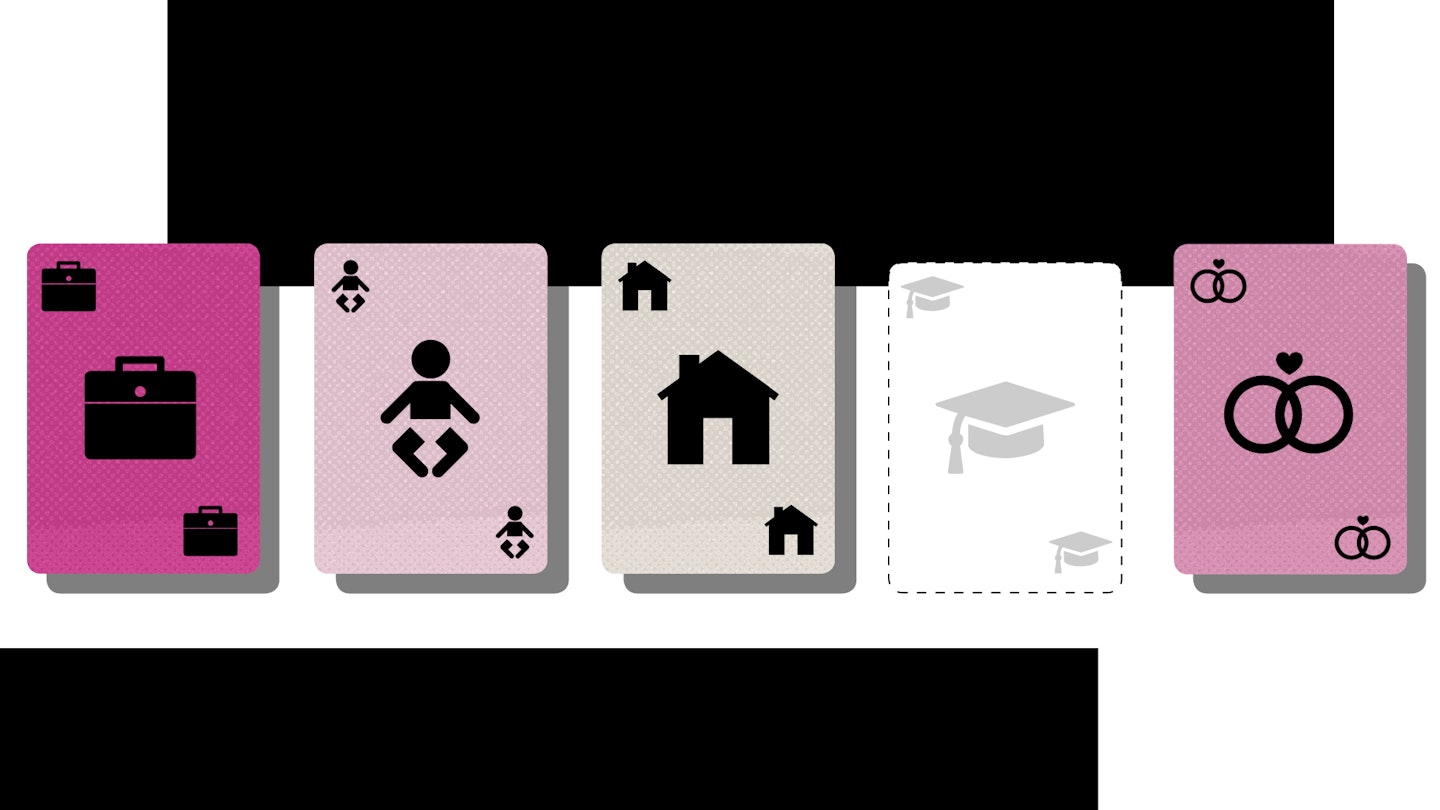The bridesmaids’ dresses for my sister’s wedding were a deep jewel-toned purple. As I stood outside on a sunny but chilly November day, posing for pictures with the rest of the wedding party and towering over the other, petite bridesmaids, I felt like nothing less than a lumbering Barney, the big purple dinosaur character. It didn’t help that, at 34, I was a solid seven years older than my 27-year-old sister and I was also at her wedding by myself, because I was single. I had broken up with a long-term boyfriend the year before and was currently ‘involved’, if you could call it that, with a writer on the magazine I worked for, who was prone to disappearing for weeks at a time and resurfacing when he was back in town and wanted to have sex.
My life, in general, was a far cry from my sister’s life of matching china patterns and a stable job as a lawyer. Not only was I single, but I’d taken so many meandering turns in my twenties and thirties that I was starting to get whiplash. After enrolling in, then dropping out of, a PhD programme in my early twenties, I’d worked in journalism for a couple of years, then gone back to school for a graduate degree in journalism, only to end up as an intern at 29 – four years older than my 25-year-old boss, the department’s assistant. Since then, I’d been laid off from a newspaper job in the middle of the Great Recession, worked part-time as an editor at a tabloid, freelance-written dozens of articles, and finally landed a job at Rolling Stone as a web editor, where I was demoralised and frustrated. Meanwhile, the man I thought I was going to marry turned out to not be as interested in marrying me, and I was back living alone in an apartment where I could hear the mice scurrying up and down the skirting all night.
My sister’s wedding, then, was just the culmination of a years-long feeling that I was spinning my wheels, professionally and personally. I’d never seen myself as someone who was obsessed with the traditional markers of adulthood, like marrying, having a child or buying a house. I had dismissed those milestones as overly conventional, and yet, standing next to my sister as she said her vows, I started to feel like maybe I wasn’t making unconventional choices, I was just getting left behind.
Then again, if the traditional markers of adulthood were what I was basing my feelings on, I certainly wasn’t alone. As Kayleen Schaefer writes in But You’re Still So Young: How Thirtysomethings Are Redefining Adulthood, in 2016 only 24% of Americans had completed the five major milestones of adulthood, as defined by sociologists, by 34 – the exact age I was when I was my sister’s maid-of-honour.
In the UK, the pattern is similar: as of 2017, the average age for first marriage had risen to 35.7 for women, up from 33.8 in just a decade, while the average age of first-time buyers rose from 31 to 33 in the decade to 2018*.
Over the next couple of years, I watched as more and more friends got married, started families and got on the property ladder (all faithfully documented on social media, of course). Professionally, from the outside, I had my ‘dream job’ as the executive editor of BuzzFeed, but inside I was miserable, stressed out by the work and uncomfortable being a boss. I despaired of ever feeling like I had ‘figured it out’.
It wasn’t until I moved to Los Angeles from New York when I was almost 36 that I was able to start to have a new perspective. Whereas previously, I had obsessed over whether or not guys liked me, which led to a series of increasingly inappropriate dalliances, I now saw that I had the power to consider whether I liked them – a subtle shift that reminded me of my own agency in the trajectory of my life. A year later, on Tinder, I met the man who would become my husband. Soon after our wedding, we learned that his low sperm count meant that we would have to have IVF if we wanted a biological child, which started us down a path of expensive and emotionally draining fertility treatments. By this point, I was almost 39 and, over the next two-and-a-half years, I’d learn that sometimes your body just doesn’t want to cooperate with whatever timeline you think you’re on.
Meanwhile, at 40, I left my job at BuzzFeed for the uncertain world of full- time podcasting, as co-host of Forever35, and I was more fulfilled and professionally happy than I had ever been. But it had taken many years and many jobs to get there – years when I despaired that I would ever find a career that felt meaningful, and one I was genuinely good at. And then, a few weeks before I turned 41, after many failed cycles of IVF and tens of thousands of dollars down the drain, I had my son.
Now I’m 44 and more at peace with my life and who I am than ever before. I spent so much of my twenties and thirties comparing myself to other people, thinking I wanted what they had and feeling like I had been left behind. But I had to figure out the life I wanted to lead, not the one I felt like I should be leading. Tying the knot at 27 may have been right for my sister, but there was no way I was ready for marriage at 27. So if there’s anything that life has taught me, it’s that we all bloom at our own pace, in our own time – and that’s OK.
